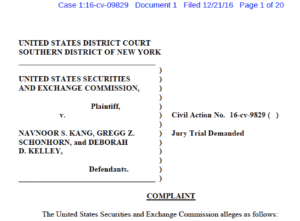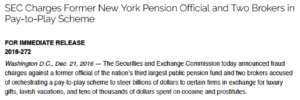Types Of SEC Cases: Public Pension Fraud
SEC Accuses New York Plan Official And Registered Reps Of Public Pension Fraud
The U.S. Securities and Exchange Commission (“SEC”) charged a former official of the New York State Common Retirement Fund (“NYSCRF” or the“Fund”) with conducting a public pension fraud. The Commission also charged two registered representatives at different broker-dealers with participating in the public pension fraud scheme and assisting in its concealment.Billions Awarded In Public Pension Fraud Scheme
According to the SEC’s court Complaint, during the period from January 2014 to February 2016, Navnoor Kang used his position as the Director of Fixed Income for the New York State Common Retirement Fund to illegally award almost $3.5 billion in securities trades to registered representatives Gregg Schonhorn and Deborah Kelley.
The SEC’s court Complaint
- A luxury watch worth $17,400;
- A $4,200 Hermes bracelet for Kangʼs girlfriend;
- Hotels and ski vacations worth over $50,000;
- Roughly $50,000 on tabs for strip clubs, restaurants, bars, and lounges; and
- VIP tickets for a Paul McCartney concert ($6,400).
We allege that rather than compete fairly for business from the New York State Common Retirement Fundʼs $50 billion fixed income portfolio, Schonhorn and Kelley bribed their way in, lining their pockets with millions in commissions along the way … Moreover, they allegedly assisted Kang in covering up his misdeeds, with Kelley going so far as to help Kang obstruct the SECʼs investigation.

The SEC’s press release
The Public Pension Fraud Violated Securities Laws
The SEC charged that, as a fiduciary of the NYSCRF, Kang was required to disclose his solicitation of Schonhorn and Kelley, as well as the gifts and benefits that they provided to him. The SEC asserted that by not doing so, Kang violated the antifraud provisions of the Securities Act of 1933 and the Securities Exchange Act of 1934. Due to their participation in the public pension fraud scheme, and their actions to hide it from their employers and the NYSCRF, the SEC also charged Kelley and Schonhorn with committing fraud. In the press release, the Director of the SEC’s Enforcement Division made clear the SEC’s position:Kang owed a duty not only to the New York State Common Retirement Fund but to the more than one million public servants and beneficiaries that are served by the fund, including police and fire personnel who count on their pensions to take care of them and their families … This action demonstrates that the SEC will not tolerate public officials who abuse public pension funds to satisfy their own greedy and wanton desires.
Whistleblowers Can Report Public Pension Fraud To The SEC
This case illustrates some types of misconduct that could give rise to SEC whistleblower cases if reported to the Commission through the SEC whistleblower program. However, the SEC has not made any public statement as to whether this case was itself an actual SEC whistleblower case. The SEC Office of the Whistleblower posts Notices of Covered Action (“NoCA”) for Commission actions where a final judgment or order results in monetary sanctions exceeding $1 million. The NoCA list does not disclose if a particular Enforcement action was brought as the result of an SEC whistleblower case, tip, complaint, or referral being filed with the Commission.Additional Information
For more information about public pension fraud, click on the links below:- The SEC’s court Complaint in SEC v. Kang, et al. (External link to the SEC’s website.)
- The SEC’s Press Release announcing the case. (External link to the SEC’s website.)
- Article about SEC v. Kang, et al. (Note: external link to The Pickholz Law Offices website.)







